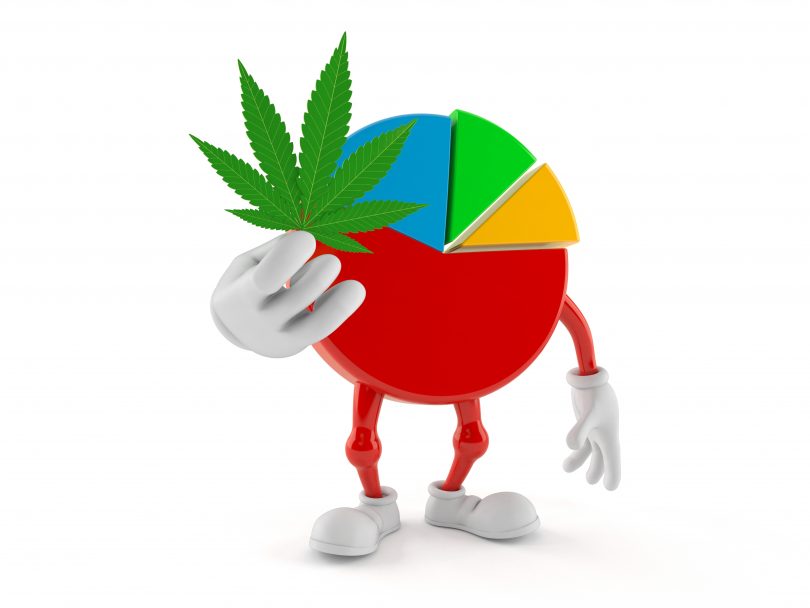Without a uniform federal system, it can often be difficult to get hard numbers to paint an actual portrayal of data in the cannabinoids industry, particularly related to sales. Different publications produce their own numbers based on different metrics, but there are holes where a lot of data should be. One metric of late comes from kush.com, and seeks to answer the question of what hemp products its consumers search for most.
What hemp products do people search for most? Well, we have no formal answer to that, but kush.com pulled together some data from its site to show us what its customers are searching for. Is it helpful? You be the judge! We cover everything under the sun in the world of weed, and you can follow along by signing up to the THC Weekly Newsletter, for a daily dose of industry news. Plus, get direct access to deals on products like vapes, edibles, and other paraphernalia, and on cannabinoid compounds, as well. Check out our 420 deals to get the most out of April 20th, and to ensure a blissful and sky-high holiday!
What is kush.com
Before getting into what information was released, best to have an idea of who released it. The company kush.com specializes in supply chain solutions that alleviate risk and compliance issues for all transactions. According to the company, over 6,000 professionals currently use its service. “Kush builds bridges between producers, processors and retailers with a carefully curated network of verified and vetted buyers and sellers.”
Aside from that, kush.com’s main purpose is as a standard marketplace, which sells CBD products, ‘hemp-derived’ products, and other cannabis products. Kush.com goes by the standard industry line in terms of its products’ legality. It says that all products are federally compliant by being hemp-derived and having less than .3% THC. However, as we’ve gone over in many posts, none of these products are made without synthetization, meaning they are illegal, as has been backed up by the DEA.
Shopify already banned such products a couple months ago, likely at the behest of the US government, in an effort to curb an industry it otherwise has no control over. While kush.com doesn’t seem to be pulling shadier tactics, like using brand names of other companies to sell products, or putting dispensary logos on products, it is wholly part of what is already a questionable industry.

As such, all information coming from them should be taken with a grain of salt. However, even salty information is sometimes best if nothing else exists. The following is kush.com’s breakdown of what hemp products people search for most on its site. Maybe it’s not the information we technically want the most, but its the crumb that’s been dropped down to us for now.
What did kush.com do?
According to kush.com, it collected sales data from thousands of customers to see what they’re searching for, which included 200,000 search results. The searches come from the last few months, with nothing more said about time frames. All searches are the result of people looking for products directly on the company site, and the results do not include standard Google searches. Therefore, this metric is only related to kush.com directly.
This is also not sales data, just to be clear. None of what’s to follow indicates a direct sale, so if sales were put up against searches, it could show some very different information. These are only search results, and though they may show interest in a product, they are not indicative of company revenue.
Last thing to know is that kush.com was specifically looking at searches for different Hemp Finished Goods. ‘Hemp Finished Goods’ relates to products that come from hemp, and in this case, can mean all products from vapes to oils to edibles to lotions, and so on.
What hemp products do people search for most?
Kush.com’s search results show that the most searched for hemp products are vapes, with 28.7% of searches relating to these items. Second up was edible candy, which accounted for 18.1% of searches. Dabs and concentrates took the third spot for most searched-for hemp items, with 13.1% of searches, and packaged flowers found themselves in fourth place with 10.6% of searches pointed in that direction.
The rest of the search results go as follows: 9.8% for pre-rolls, 5.2% for tinctures, 4.6% for drinks, 3.3% for lotions, 3% for edibles, 2.3% for capsules and tablets, .8% for pet treats, and .6% for bath bombs. It should be noticed that many of the categories overlap. For example, edibles got 3%, but drinks got 4.6% and candy got 18.1%, which equal 22.7% together. Or you can put together flowers and pre-rolls for 20.4% of search results.

Vapes, edibles (particularly candy), and flowers were the most searched for finished hemp products on kush.com’s site. If nothing else, vendors on kush.com can use this to determine the best way to list products. After all, if selling infused chocolates, it looks like more people will search under ‘candy’ than ‘edibles’, making it easier to get to consumers by listing the product as ‘candy’.
It bears repeating, this has nothing to do with sales information, and though the data could be similar, searches don’t predict sales. It could be that kush.com had its highest sales in flowers, not in vapes. Or that only 1% of clients went on to buy a tincture, though over 5% of search results indicate interest. If kush.com had released accompanying sales data, we’d be able to more closely investigate how close these aggregated searches are to final sales data, but for now, this is the most we’ve been given.
Of course, that’s also one of the bigger questions of this hemp-derived industry in general. Just how big are sales? The cannabinoid market is a very controversial one, but its also a very below-board one, which means not many companies are willing to release their data. Or I assume that’s why it’s been so problematic finding data.
For whatever the reason is, answering the simple question of how much money do these companies bring in, has been a black hole, with infographics like this offering the most anyone wants to give. Did we really learn a lot here? Not really. Apart from vendors possibly getting insight on how to list products, we aren’t increasing out knowledge base with anything interesting.
Other questions it raises
Apart from how this relates to sales data, there is also the question of what particular goods were searched for. Like, in the category of vapes, what percentage of the searches were for delta-8 products, how many were for CBD, and how many for HHC? It could be that one of these categories clearly dominates, or that they rather evenly share the field. It would be very useful to know what products in each category are searched for most.
The same goes for a category like ‘candy’. Gummies have grown in interest all over, but how do they compare to chocolate bars? And are other baked goods in this category, or in another? Then there is the question of whether kush.com counted searches in multiple categories. For example, if a person searched for infused sodas, would it count in just ‘drinks’, or in ‘drinks’ and in ‘edibles’? Same question for gummies, and pet treats that are also edibles. And it can be applied to flowers and pre-rolls, as well.

I’m also curious, when looking at this kind of data, of how many searches each searcher did. It could be that the majority are just people going through the site, with each searcher checking out tons of different categories before making a purchase, or leaving without purchasing. How many categories did the average searcher check out? If its 10, then this data wouldn’t relate well to sales figures, but if its one or two, it indicates that searchers were more specific in what they were looking for, and probably more likely to buy.
Conclusion
How useful an infographic like this is, is hard to say. Sure, it provides a tiny peak at some information, but if you’re like me, and you want more expressive information on the field, something like this not only falls short, but appears to be more a marketing scheme to get traffic, then an actual scientific output meant to add to the understanding of the overall market. I’m not terribly impressed in the end. I’d be more impressed with real sales data, something that’s never released in this industry.
Whether that’s because these companies don’t want the federal government knowing their true sales information, or a lack of result to meet the built-up facade of sales, I have no idea. But they should be out there, and they’re not, and this offering is a paltry substitute, for real and useful information.
Thanks for stopping by out little site! Welcome to CBDtesters.co, your premiere internet spot for comprehensive independent news covering the cannabis and psychedelics industries. Join us frequently to keep up-to-date on the quickly-moving universe of cannabis and psychedelics, and check out The THC Weekly Newsletter, for a daily dose of industry news.









